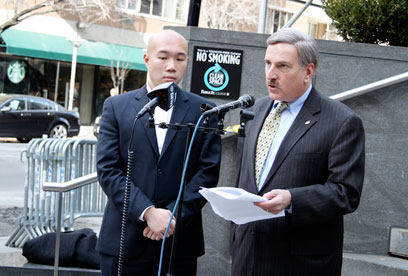By Kelsey Durham
State Assemblyman David Weprin (D-Fresh Meadows) announced new legislation Sunday aimed at cracking down on hazing after the recent death of Michael Deng, a 19-year-old Baruch College student from Oakland Gardens who died in December from injuries he sustained during a fraternity hazing ritual.
Weprin held a news conference Sunday afternoon outside Baruch College, at the corner of 24th Street and Lexington Avenue in Manhattan, where he described a bill he has named “Michael Deng’s Law.” The bill is designed to amend the current definition of hazing in the New York penal code to include any physical contact that puts another person at risk for injury during any kind of initiation.
Weprin said he drafted the legislation in response to the death of Deng, who died Dec. 8 after suffering a head injury while he was blindfolded and forced to carry a 20-pound bag of sand across a yard while fraternity members tried to physically stop him at a site in the Pocono Mountains, according to a court affidavit filed by the Pocono Mountain Regional Police Department.
One fraternity member told authorities that the Oakland Gardens resident was brought into the house where about 20 brothers were staying and was unconscious for more than an hour, the police affidavit said.
The fraternity brothers Googled Deng’s symptoms, changed his clothes and then drove him to the hospital, according to the documents, and Deng was pronounced dead from what the Monroe County district attorney described as “major brain trauma.”
Deng’s death was ruled a homicide earlier this month, according to a spokeswoman for the Luzerne County coroner’s office.
“Michael Deng was a brave young man who tragically lost his life due to a hazing incident,” Weprin said. “This is a widespread problem on and off campuses and this bill is intended to prevent deaths and serious injuries caused by hazing.”
Under New York law, first-degree hazing is a Class A misdemeanor while second-degree hazing is a violation. Weprin’s bill does not change the classifications or the punishment for the offenses, but adds a clause strictly stating physical contact that creates a risk of injury would now clearly be called hazing.
Weprin said with the law as is, it is hard to argue what hazing is and what it is not when incidents occur, but he said he hopes to give a more clear-cut definition with his new legislation to prevent further acts such as the one that led to Deng’s death.
“There’s no need for an initiation that causes contact because once you have contact it’s hard to control the outcome,” he said. “The best way for us to honor Michael Deng is to ensure that no student is ever put in a situation where their safety is in jeopardy.”
State Sen. Tony Avella (D-Bayside) said later in the week that he was deeply saddened to hear of Deng’s death as a result of what he called a “horrible hazing ritual” and applauded the Pennsylvania authorities for their thorough investigation.
Avella agreed with Weprin’s legislation and said that although New York currently has hazing laws, more needs to be done to prevent incidents such as these in the future.
“Despite the current laws already on the books, devastating occurrences of hazing continue to appear throughout the country,” he said. “I am therefore glad that the state Legislature is seeking new ways of preventing such tragedies in honor of Michael Deng.”
Jacob Chen, a close friend of Deng’s who said he served as Deng’s mentor for much of his adolescence, joined Weprin at the news conference and said he was happy to see someone working to send a message to fraternities all over the state.
“Michael was a great kid, warm, sunny, smart and charming, and his loss was a terrible tragedy to the world and everyone who knew him,” Chen said. “I’m honored to be here and help send a powerful message to fraternities and let them know that these actions are unacceptable.”
Weprin said he introduced the bill no more than a few weeks ago and the legislation already has 15 co-sponsors across the state who have backed the assemblyman on the measure. He said he thinks there is great support for the bill so far and hopes it will pass before the legislative session ends in June.
“I just hope that this law does what the state is going for,” Chen said. “To let everyone know that these are kids. They’re people. Hazing is dangerous and stuff like this can’t continue to happen.”
Reach reporter Kelsey Durham at 718-260-4573 or by e-mail at kdurham@cnglocal.com.






































